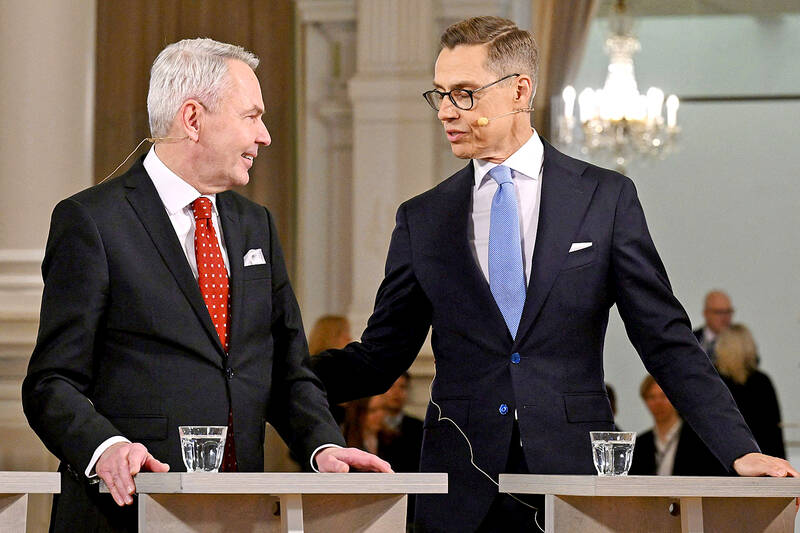Favorites Alexander Stubb and Pekka Haavisto on Sunday qualified for the second round of Finland’s presidential election, which took place against a backdrop of soured relations with neighboring Russia.
With all votes counted, conservative former Finnish prime minister Alexander Stubb won 27.2 percent of the vote, while former Finnish minister for foreign affairs Pekka Haavisto of the Green Party, running as an independent, secured 25.8 percent, election officials said.
Voter turnout was 71.5 percent.

Photo: AFP
They are to meet in a runoff election on Feb. 11.
“No matter who I’d face in the second round, I know we’ll have a constructive, civilized and good discussion about difficult foreign policy questions,” Stubb had told public broadcaster Yle earlier.
While the president’s powers are limited, the head of state — who also acts as supreme commander of the Finnish armed forces — helps direct foreign policy in collaboration with the government. That means that the changing geopolitical landscape in Europe would be the main concern for the winner.
“Experience in foreign policy could be what people were looking for, looking at the two who will go to the next round,” Hanna Ojanen, research director of politics at Tampere University, said as the results became clear.
Heading into the vote, experts had thought far-right Finns Party candidate Jussi Halla-aho might make it to the second round. He came third with 19 percent of the vote.
Voter Hannu Kuusitie said that the nation needs a president with “leadership” and “humanity.”
“Of course, he must also be tough when necessary,” he added.
Relations between Moscow and Helsinki deteriorated following Russia’s 2022 invasion of Ukraine, prompting Finland to drop decades of military non-alignment and join NATO in April last year. Russia, with which Finland shares a 1,340km border, swiftly warned of “countermeasures.”
By August last year, Finland observed an influx of migrants entering through its eastern border without visas. Helsinki claimed Moscow was pushing the migrants in a hybrid attack to destabilize it, and Finland closed the eastern border in November.
“We are in a situation now where Russia and especially [Russian President] Vladimir Putin is using humans as a weapon,” Stubb said on Thursday evening during a final televised debate. “It’s a migrant issue, it’s a ruthless, cynical measure, and in that case we have to put Finland’s security first.”
Haavisto said that Finland had to “send Russia a very clear message that this can’t go on.”
In the post-Cold War period, Helsinki maintained good relations with Moscow.
Finnish President Sauli Niinisto — who is stepping down after serving two six-year terms — once prided himself on his close ties with Putin before becoming one of his most trenchant critics. Against this backdrop, the presidential candidates are championing both Finland’s independence and its new role as a NATO member, said Hanna Wass, vice dean at the Faculty of Social Science at the University of Helsinki.
“They all seem to have a strong idea emphasizing self-sufficiency,” Wass said.
Both candidates believe Finland should “also be an active contributor in building a shared European defense and Nordic cooperation,” she added.

BACKLASH: The National Party quit its decades-long partnership with the Liberal Party after their election loss to center-left Labor, which won a historic third term Australia’s National Party has split from its conservative coalition partner of more than 60 years, the Liberal Party, citing policy differences over renewable energy and after a resounding loss at a national election this month. “Its time to have a break,” Nationals leader David Littleproud told reporters yesterday. The split shows the pressure on Australia’s conservative parties after Prime Minister Anthony Albanese’s center-left Labor party won a historic second term in the May 3 election, powered by a voter backlash against US President Donald Trump’s policies. Under the long-standing partnership in state and federal politics, the Liberal and National coalition had shared power

CONTROVERSY: During the performance of Israel’s entrant Yuval Raphael’s song ‘New Day Will Rise,’ loud whistles were heard and two people tried to get on stage Austria’s JJ yesterday won the Eurovision Song Contest, with his operatic song Wasted Love triumphing at the world’s biggest live music television event. After votes from national juries around Europe and viewers from across the continent and beyond, JJ gave Austria its first victory since bearded drag performer Conchita Wurst’s 2014 triumph. After the nail-biting drama as the votes were revealed running into yesterday morning, Austria finished with 436 points, ahead of Israel — whose participation drew protests — on 357 and Estonia on 356. “Thank you to you, Europe, for making my dreams come true,” 24-year-old countertenor JJ, whose

A documentary whose main subject, 25-year-old photojournalist Fatima Hassouna, was killed in an Israeli airstrike in Gaza weeks before it premiered at Cannes stunned viewers into silence at the festival on Thursday. As the cinema lights came back on, filmmaker Sepideh Farsi held up an image of the young Palestinian woman killed with younger siblings on April 16, and encouraged the audience to stand up and clap to pay tribute. “To kill a child, to kill a photographer is unacceptable,” Farsi said. “There are still children to save. It must be done fast,” the exiled Iranian filmmaker added. With Israel

Africa has established the continent’s first space agency to boost Earth observation and data sharing at a time when a more hostile global context is limiting the availability of climate and weather information. The African Space Agency opened its doors last month under the umbrella of the African Union and is headquartered in Cairo. The new organization, which is still being set up and hiring people in key positions, is to coordinate existing national space programs. It aims to improve the continent’s space infrastructure by launching satellites, setting up weather stations and making sure data can be shared across